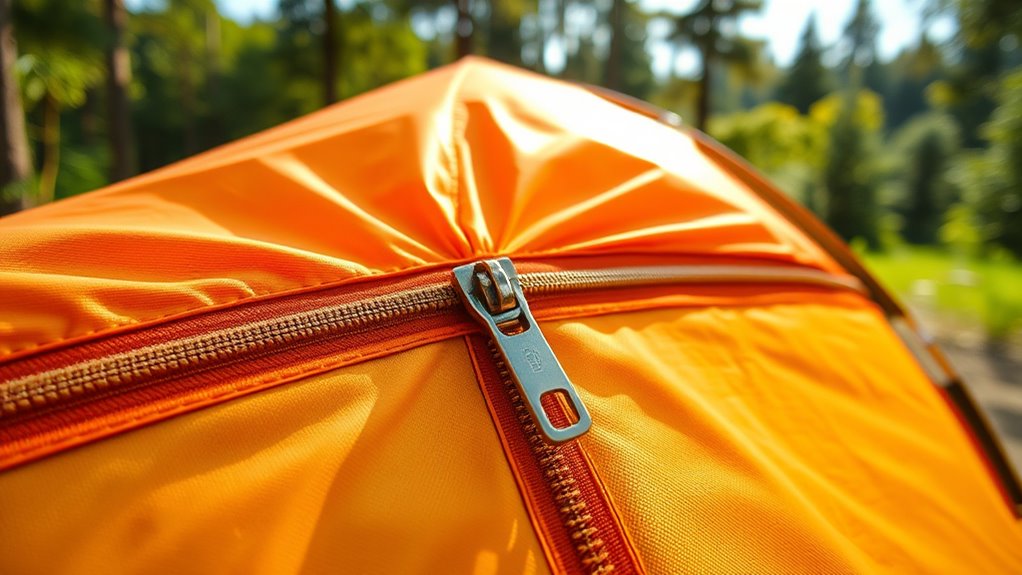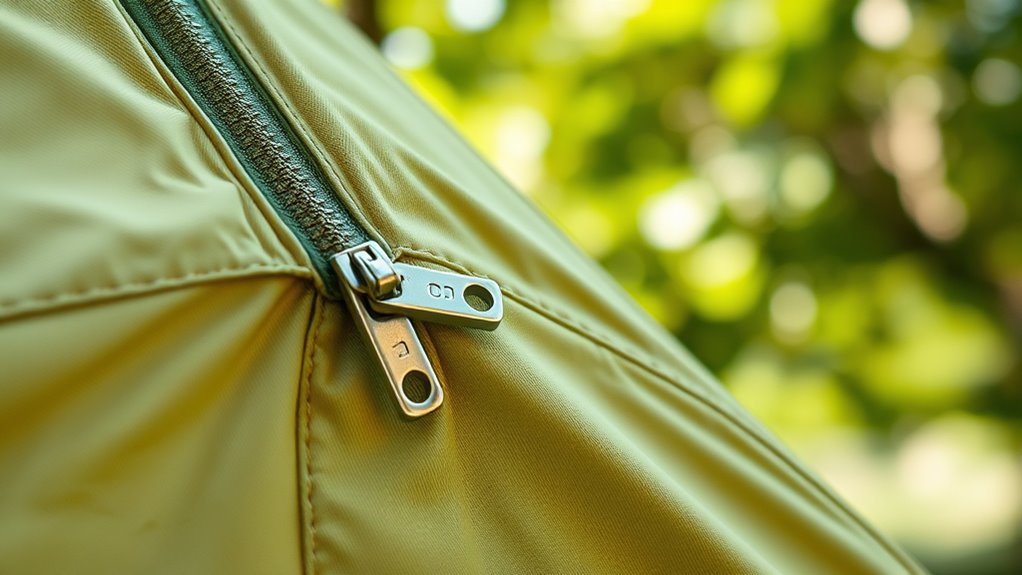To prevent jammed zippers and extend your tent’s lifespan, regularly lubricate the zipper with a silicone spray or specialized lubricant, applying it sparingly along the teeth and slider. Work the zipper back and forth to distribute the lubricant evenly, which keeps dirt and grime at bay. Inspect your zippers often for signs of wear or damage and address minor issues early. Keeping your zippers well-maintained guarantees smooth setup and takedown—discover more tips to master zipper zen.
Key Takeaways
- Regularly inspect and clean zippers to remove dirt and debris that cause jamming.
- Lubricate zippers with silicone spray or specialized lubricant to ensure smooth operation.
- Work the zipper back and forth after lubrication to evenly distribute the lubricant.
- Address small zipper issues promptly to prevent escalation and prolong tent lifespan.
- Practice mindful gear care to maintain functionality, reduce repairs, and extend overall tent durability.

Have you ever wondered how a simple zipper can teach us about mindfulness and balance? When you’re setting up your tent, the zipper often becomes a small but vital detail that can make or break your outdoor experience. Proper tent maintenance starts with understanding how to keep your zipper functioning smoothly. Over time, dirt, debris, and repeated use can cause your zipper to become sticky or jammed, turning a simple task into a frustrating ordeal. That’s where zipper lubrication comes in—by maintaining your zipper regularly, you prevent those annoying snags and extend the life of your tent.
Think of zipper lubrication as a form of mindfulness. When you take the time to care for your gear, you become more aware of its condition and your relationship with it. A well-lubricated zipper glides effortlessly, saving you time and energy, especially when you’re in a rush to pack up or set up. You don’t need fancy products—just a bit of silicone spray or a specialized zipper lubricant works wonders. Apply it sparingly along the teeth and slider, then gently work the zipper back and forth. This act of mindful maintenance keeps your tent in top shape and prevents minor issues from escalating into bigger problems.
Regular tent maintenance isn’t just about keeping your zipper running smoothly; it’s about cultivating a sense of respect for your gear. When you inspect your tent before and after each trip, you learn to recognize signs of wear and tear early. This proactive approach helps you address potential problems before they cause damage or inconvenience. For example, if you notice a small tear or loose seam, fixing it promptly can avoid more extensive repairs later. Keeping the tent clean and dry also helps prevent mold, mildew, and fabric deterioration, ensuring your investment lasts through many adventures.
Frequently Asked Questions
How Often Should Tent Zippers Be Lubricated for Optimal Performance?
You should lubricate your tent zippers every few uses or at the first sign of resistance. Good zipper maintenance involves choosing the right lubricant—preferably a silicone-based or wax lubricant—to prevent jams and prolong zipper life. Regular lubrication keeps zippers moving smoothly, especially after exposure to dirt or moisture. By maintaining your zippers properly, you’ll ensure easy setup and takedown, extending your tent’s overall lifespan and enjoyment.
What Are the Best Methods to Prevent Tent Zipper Jams?
To prevent tent zipper jams, practice regular zipper maintenance by cleaning the teeth with a soft brush and applying a suitable lubricant. Always check tent material compatibility before using any lubricant to avoid damage. Keep zippers free of dirt and debris, and handle them gently during use. These steps ensure smooth operation, prolong zipper life, and maintain your tent’s integrity, making your outdoor adventures hassle-free.
Can Using the Wrong Lubricant Damage Tent Zippers?
Did you know that using the wrong lubricant can damage your tent zippers? About 60% of zipper failures are caused by incompatible lubricants. You should always verify lubricant compatibility with your zipper material, as some oils or waxes can cause corrosion or degrade the zipper over time. Using the right lubricant ensures smooth operation and extends your tent’s lifespan, preventing costly repairs.
How Do I Fix a Zipper Stuck in a Tent Without Damaging It?
If your tent zipper is stuck, don’t force it, as that could cause damage. Instead, try applying a small amount of lubricant like graphite or a silicone-based spray to the zipper’s teeth for smooth zipper repair. Gently move the zipper back and forth to loosen it. Regular tent maintenance, including keeping zippers clean and lubricated, helps prevent future issues and extends your tent’s lifespan.
Are There Specific Tent Materials More Prone to Zipper Issues?
Think of tent materials as a dance floor—some fabrics are smoother, allowing zippers to glide effortlessly, while others are rougher, causing more missteps. Lightweight nylon and thin polyester tend to be more prone to zipper issues because of their delicate fabric durability. Always guarantee your zipper is compatible with your tent’s fabric to reduce jams. Choosing sturdy, well-made tents with compatible zippers helps prevent frustration and prolongs your tent’s lifespan.
Conclusion
By mastering these zipper techniques, you’ll become a superhero of tent durability, saving yourself from the nightmare of stuck zippers and torn fabric. Imagine never wrestling with jammed entrances again, transforming your camping trips into effortless adventures. With just a little care, you’ll extend your tent’s lifespan so much, it’ll practically outlast the universe! Say goodbye to zipper chaos and hello to smooth, trouble-free entrances—because your tent deserves to stay perfect for eons to come.










